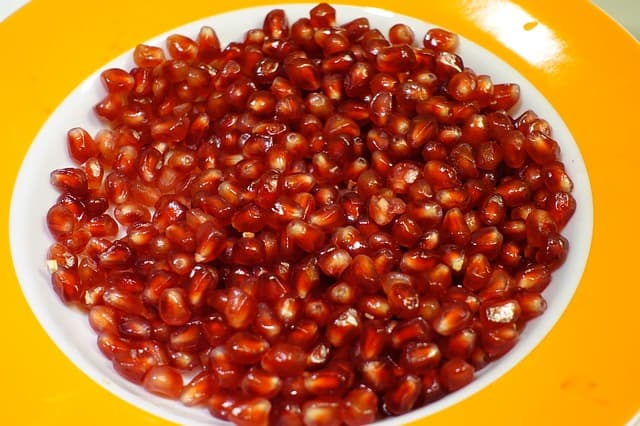So, how long do pomegranate seeds last in the fridge? Pomegranate seeds last in the fridge for 1 to 2 weeks unopened before going bad, if you store them properly in the right conditions necessary in the refrigerator.
Two weeks is not a long time but it’s certainly a long time to skip shopping or making a shopping list.
Storing pomegranate seeds in the fridge makes dish preparation easy and quick without stressing yourself out.
You are not a fan of pomegranate, because whenever you see a pomegranate you always think of the stress you will pass through, Cutting the leathery exterior and extracting many seeds without letting them stain your clothes before eating.
Did anyone ask you if pomegranate will do well in the fridge, freezer, or on the counter, and which is the best storage place?
Pomegranate seeds can be eaten raw or processed into juice.
This article will give you just the exact answers to the questions you have about pomegranate seeds.
You don’t need to throw that useful pomegranate away, all because you don’t have any idea about storage.
We will enlighten and discuss more facts and useful knowledge about the shelf life of pomegranate
Ranging from how long pomegranate seeds last in the fridge, freezer, or on the counter, to how to tell if they are bad, and how to store pomegranate to have a better use for it in the future.
I will encourage you to read this article till the very last, to get the pieces of information you need about pomegranate seeds.
Do not skip a line to avoid missing out on any vital knowledge, also drop your comment in the comment box.
Recommendation:
- How long does better bouillon last in the fridge, freezer, and at room temperature?
- Do corn tortillas go bad in the fridge, freezer, and at room temperature?
- How long does salmon roe last in the fridge, freezer, and pantry?
- Can halls go bad in the fridge, pantry, and freezer?
- How long do plantain chips last in the fridge, freezer, and at room temperature?
How Long Do Pomegranate Seeds Last After Opening?
Pomegranate seeds once opened will last on the counter for 1 to 2 days before going bad, if you store them properly in the right conditions necessary on the counter.
Once opened pomegranate seeds will last in the fridge for 4 to 6 days before going bad, if you store them properly in the right conditions necessary in the fridge.
Pomegranate seeds once open last in the freezer for 7 to 10 days before going bad, if you store them properly in the right conditions necessary in the freezer.
Whenever you have an already opened pomegranate seed, either way, you eat it immediately
Or store it in the freezer but it shouldn’t be forgotten in there.
Simply, it will go bad quickly and won’t be used for the purpose you purchased it for.
How Long Do Pomegranate Seeds Last Unrefrigerated?
Pomegranate seeds last at room temperature for 4 to 6 months before going bad, if you store them properly in the right conditions necessary on the counter.
Once you buy pomegranate seeds in bulk,
I will advise you to store it at room temperature if you don’t want the pomegranate mixed up with other veggies and fruits.
In cases where you don’t have much space in the fridge, or in the freezer, make ensure to store pomegranate on the counter.
But make sure to them immediately before going bad and do not store pomegranates on the counter for long thinking it will do well.
Storing pomegranate seeds at room temperature isn’t a bad idea,
But whenever you want longer storage of pomegranate seeds and to maintain their freshness, store them in the fridge or freezer.
How Long Do Frozen Pomegranate Seeds Last?
Frozen Pomegranate seeds will keep fresh and retain their quality for 2 to 3 months before going bad if you store them properly in the right conditions necessary in the freezer.
Do you want a longer stay or storage of your pomegranate seeds?
Then what are you waiting for?
Store pomegranate seeds in the freezer and get a fresher and nicer taste of your pomegranate when you eat raw or fresh.
Have you tried eating frozen pomegranate seeds once? (if you have let’s see your comment and how it tasted in your mouth because mine was okay)?
Are you tired of going shopping every day or week?
Buy pomegranate in bulk and store it in the freezer, it will do well in there.

How To Tell If Pomegranate Seeds Go Bad?
Many will ask Do pomegranate seeds go bad? And the answer is yes!
Pomegranate seeds go bad because they have a short shelf life when they are unattended to,
Due to improper storage, aging and so many other factors responsible.
There are so many factors to determine whether pomegranate seeds are still good for eating or they should be thrown away.
Here are some signs to tell if pomegranate seeds are bad:
Discoloration
Check the appearance of the pomegranate seeds.
When there is a form of discoloration on them, or the appearance of mold, such pomegranate seed is bad.
If the color is gradually turning down, of course, you don’t need a soothsayer to tell they are going bad.
Tear it open and see if you can use them to make a juice or smoothie combo.
Toss them, when you cannot use them again.
Mushy And Bruised Pomegranate Seeds
You need to feel the texture of the pomegranate seeds.
When the texture of the pomegranate seeds feels soft, mushy, shrunken, and bruised skin, such pomegranate seed is bad.
Off Smell
Smell the pomegranate seeds, when it smells bad, when it has a bad odor, such pomegranate is bad.
If you notice that the fresh smell is deteriorating, use them immediately but if they are bad completely.
Toss them.
Tastes Off
Taste the pomegranate seeds(since they can be eaten raw).
when it has a sour taste, or taste off, such pomegranate seed is bad.
Throw them out when they no longer taste fine.
Do pomegranate Seeds Stay Too Long In The Fridge, Freezer, Or At Room Temperature?
When your pomegranate seeds have been sitting for too long on the counter, in the fridge, or the freezer, such pomegranate is bad.
And should be discarded with immediate effect.
Never eat spoiled food, especially, bad vegetables.
This is because you have nothing to offer but instead they are reducing your system’s working capacity
And the effect of eating bad food might result in food poisoning or illness.
How To Store Pomegranate Seeds
Even the fact pomegranate seeds don’t have a long shelf life
It doesn’t mean they can’t be stored for a longer time.
Here’s a step-by-step guide on the best ways to store pomegranate seeds:
Step 1: Choose Ripe Pomegranates
Select ripe and unblemished pomegranates for the best quality seeds. Look for fruits that are heavy for their size and have vibrant, uncracked skin.
Step 2: Extract the Seeds
- Cut the Crown: Slice off the crown (top) of the pomegranate, exposing the seeds.
- Score the Skin: Make shallow cuts along the natural ridges, forming sections.
- Open the Pomegranate: Gently pry the sections apart, and use your fingers to loosen the seeds from the membrane.
Step 3: Store Fresh Pomegranate Seeds
If you plan to use the seeds within a few days, store them in the refrigerator:
- Refrigerator Storage: Place the fresh seeds in an airtight container or a resealable plastic bag. Store in the refrigerator for up to 3-4 days.
Step 4: Freeze Pomegranate Seeds
For longer-term storage, freezing is an excellent option:
- Pre-freezing Individual Seeds: Spread the seeds in a single layer on a baking sheet and place them in the freezer until they’re individually frozen. This prevents them from clumping together.
- Transfer to a Container: Once individual seeds are frozen, transfer them to a freezer-safe bag or container, removing excess air to prevent freezer burn.
- Label and Date: Label the container with the date and store it in the freezer for up to 6-12 months.
Step 5: Tips for Storing Pomegranate Seeds
- Avoid Moisture: Ensure the seeds are dry before storage to prevent mold or spoilage.
- Use Airtight Containers: Airtight containers or bags help maintain freshness and prevent odors from the freezer.
- Avoid Excess Air: When freezing, remove as much air as possible from the storage container to prevent freezer burn.
- Label and Date: Always label containers with the date to track freshness and ensure you use the oldest seeds first.
What Happens If You Eat Bad Pomegranate Seeds?
Consuming bad or spoiled pomegranate seeds can lead to foodborne illness and adverse health effects. Here are some potential consequences of eating bad pomegranate seeds:
- Food Poisoning: If pomegranate seeds are contaminated with harmful bacteria, such as Salmonella or E. coli, eating them can cause food poisoning. Symptoms may include nausea, vomiting, abdominal cramps, diarrhea, fever, and other gastrointestinal issues.
- Mold Toxicity: Spoiled or moldy pomegranate seeds can contain mycotoxins produced by molds. Ingesting these toxins can lead to mycotoxicosis, which may cause symptoms such as nausea, vomiting, abdominal pain, and in severe cases, organ damage.
- Allergic Reactions: Mold spores on spoiled pomegranate seeds could trigger allergic reactions in some individuals. Symptoms may include itching, swelling, hives, and difficulty breathing.
- Gastrointestinal Distress: Even without the presence of pathogens or toxins, eating spoiled food can cause general gastrointestinal discomfort, including stomach upset, gas, and bloating.
Conclusion
These amazing succulent seeds are a rich source of nutrients.
Nutrients like potassium, proteins, folate, fiber, vitamins K and C are all in different proportions.
They contain plant compounds with high medicinal value, which help in inflammatory diseases,
Helps to fight against cancers like prostate cancer and breast cancer.
It aids in lowering blood pressure, arthritis, erectile dysfunction, fungal
Or bacterial infection, memory balance, exercise improvement, and may help to lower the risk of heart diseases.
Do not alter our shelf life estimates with your medical advice.
If you eat bad pomegranate seeds and you are experiencing some irregular bowel movements, see a doctor.
Maintain food hygiene and food safety always. Eat well and stay healthy.
Our shelf-life sources come from personal experience, experiments, and research from other high-profile websites and journals.
Remember, I started with the question ”how long do pomegranate seeds last in the fridge?”
